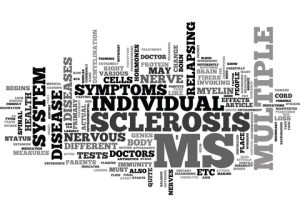“Questions and Concerns”
April 5, 2013
On March 27, a news article stated “The U.S. Food and Drug Administration has approved Tecfidera™ capsules (dimethyl fumarate, Biogen Idec –formerly “BG-12”) as a first-line disease-modifying therapy for people with relapsing forms of MS.”
This is the tenth DMD (Disease Modifying Drug) that has been approved by the FDA to reduce the progression and activity of the disease. It is also the third DMD approved in the past two years that can be taken orally in lieu of an injection, exciting many persons who have MS.
The National MS Society and most neurologists, are strong proponents of these DMD’s, and recommend starting one as soon as a diagnosis is made. “Taking a disease-modifying therapy is currently the best way to reduce MS disease activity and future deterioration,” states an article on the internet front page of the National MS Society today.
Is it the best course of action to take for everyone? Here is a list of questions/concerns to think about when deciding whether to use a disease modifying drug:
1. Is it wise to start a treatment that was just FDA approved (or just approved in the past couple of years), without knowing the long-term side effects?
• None of the DMD’s decrease the relapses 100%; most decrease them in the 28-68% range. Is this enough to justify the possible long-term effects of possible liver, kidney or heart damage? Built up resistance? Other serious health implications? What if the person is only a teen or very young and has decades of life ahead of them?
• The biggest fear of having MS is the loss of mobility, although there are numerous other symptoms of MS that are disturbing. This fear is exemplified by slogans, ads, pictures and more. Yet, for years the statistics estimated that 25% of MS patients end up using a wheelchair during their life. After living with MS for 32 years, I am one of those people in a wheelchair. Maybe this sounds stupid to someone, but I personally feel that I would rather manage living in a wheelchair than with a damaged liver.
• What happens if the DMD is found to not work after all? News came last July that an extensive study suggests interferons, the basis for many DMD’s, did not reduce MS progression. This news was alarming. “Can this be true?–after all those years of injections, tests, office visits, side effects, dollars spent….” were comments expressed in social media.
Within the above-mentioned article, Bruce A. Cohen, MD, Professor, Davee Department of Neurology and Clinical Neurosciences at Northwestern University’s Feinberg School of Medicine, and Chair of the National MS Society’s National Medical Advisory Committee states “As with all newly-approved treatments, we will learn more about the benefits and safety of Tecfidera over time.” Hmmm—does this comment concern you?
2. Does the decreased rate of 28-68% of possible reduced relapses warrant the short-term side effects and other things people experience with DMD treatment?
• Yes, treatments do have side effects, and again they vary widely for each individual. Nausea, flu-type symptoms, dizziness, site-injection soreness and fatigue are some but not all common complaints. One has to ask and decide for him/herself if the treatment is worth it; for example, feeling like you have the flu 1-2 days a week after an injection. Or putting it another way, which is the lesser of two evils? In addition, I hear and read so often in social media about how frequently MSers change their DMD because of the side effects, or that it is not working in slowing the progression.
• DMD’s require much monitoring–doctor visits, MRI’s, clinic visits… The therapy adds more cost, are time-consuming and exhausting. Fatigue—a very disabling symptom 90% of MSers experience—is compounded.
• Taking a DMD is a difficult regime. It adds physical, emotional and mental stress on the body. These could lead to depression, and more fatigue. It is possible that the stress of taking a DMD could nullify any possible benefit of it for some people.
• Treatments are expensive. The price tag on this new treatment is $55-60,000! While some patients get financial assistance through the drug companies or being a clinical trial participant, many others pay thousands of dollars annually out-of-pocket. I’m becoming quite cynical of pharmaceutical companies when I see their expensive ads, exhibits and give-aways at events.
3. Should a newly-diagnosed person start a treatment without first evaluating how aggressive or mild their disease course is?
• Up until 1996, a type of MS included a “benign” course. Up to 20% of MS patients had this type of relapsing-remitting, in which few relapses occurred that would go away and leave very little or no residual damage or disability. Symptoms were primarily sensory, but could include others such as motor or bladder disturbances. The term is no longer used, and this type is now included with the relapsing remitting type.
The point is that many persons diagnosed with MS could have a mild case, and how would they know if they started a treatment immediately after diagnosis? In addition, a newly-diagnosed person is usually quite stressed and often prescribed other drugs to relieve symptoms or the relapse. The waters become muddy in knowing what is causing what, positively or negatively, when everything is happening at the same time.
• A newly-diagnosed person should take notes and keep a journal about their symptoms, reactions to any drugs given for a symptom or a relapse, etc. to learn about their own case of MS. Delaying a treatment of several months will make little difference in the overall course of the MS. Not taking care of oneself, feeling pressured by doctors/others, and chronic stress can affect the MS as much as not taking a DMD.
• Meantime, research the studies thoroughly about a drug before going on one. Do it from a variety of sources. Carefully evaluate the studies behind the drug—number of people involved, length of the study, type of study, etc. Use common sense, and remember that this is your body and ultimately your personal decision.
4. To expand on #3 above, has both the doctor and the person with MS evaluated his/her course for a reasonable period of time before starting a DMD?
• Each person with MS has a different course of progression, relapses and symptoms. No two cases are alike. Patterns of these factors will emerge after awhile. What are the frequency, severity, duration and residual of a relapse? Is the relapse being defined properly? MS is sensitive to many things, and several days or even a week of intensified symptoms does not necessarily indicate a relapse.
• The number and location of lesions being used as the sole indicator of disease progression can be leading. New and old lesions cannot always be distinguished and lesions showing on one MRI may not appear on the next one.
5. Do doctors honestly know if a slowing of progression is from a DMD? Couldn’t less lesions result from the natural course of the disease itself or any health/wellness program a patient is following?
• The truth is, DMD’s are difficult to monitor accurately. And it is worthwhile to note that DMD’s are not meant to make a person feel better.
6. Why isn’t there more emphasis on managing MS from a non-medicinal standpoint? Why are drugs pushed as the first line of defense?
• Since there currently is no cure for MS, the objective is to reduce the amount and severity of relapses to prevent further damage to the central nervous system until a cure is found. It is common sense that a comprehensive therapeutic approach should be taken to treat MS.
• There is no single drug to make MS go away. While drugs play an important role in helping symptoms, relapses and the course of MS, there are so many non-medicinal things a person can do to both manage and control it as well without side effects. Examples include:
– Taking care of oneself with proper diet, exercise, sleep, low stress…
– Not getting sick or infections since MS is an autoimmune disorder.
– Alternative therapies, such as Yoga, Pilates, Tai Chi, massage…
There are many MSers who use this approach successfully to manage their MS, while taking drugs for symptom relief or relapse treatment (corticosteroids) as needed.
Sure, I want a cure or an effective treatment just as much as the next person, but I have always weighed my options carefully. I’m only 57 and I have many of years ahead of me. So I have to make sure I do my research and ask questions in order to make the right choices. Shouldn’t everyone?
www.DebbieMS.com


 “What’s going on?—I’m so scared!”
“What’s going on?—I’m so scared!”